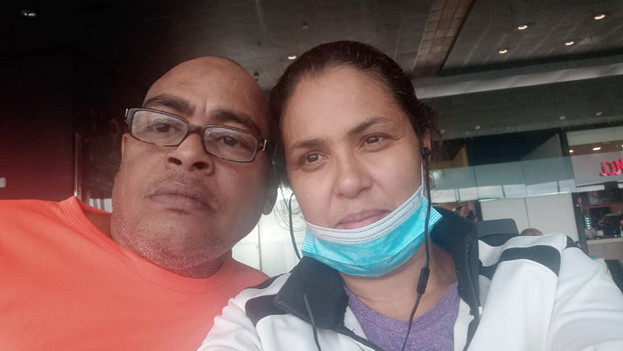
![]() 14ymedio, Yoani Sánchez, Havana, 15 February 2022 — Cuban journalist Yailén Insúa Alarcón, 42, and her husband, Boris Luis Ramos Salgado, 48, have been sleeping on the floor of Bogotá’s El Dorado airport for ten days. “The most stressful moments are when there are flights to Cuba and we fear that they will deport us on one of them,” she tells 14ymedio.
14ymedio, Yoani Sánchez, Havana, 15 February 2022 — Cuban journalist Yailén Insúa Alarcón, 42, and her husband, Boris Luis Ramos Salgado, 48, have been sleeping on the floor of Bogotá’s El Dorado airport for ten days. “The most stressful moments are when there are flights to Cuba and we fear that they will deport us on one of them,” she tells 14ymedio.
“Now we are in a migratory limbo. Initially, the Foreign Ministry told us that it could not study our case because we were in the transit zone of the airport, but then an appeal for guardianship was filed and a judge ruled saying they must give us a five-day safe conduct to leave and to be able to process the asylum application.”
“We haven’t even been able to shower since we’ve been here, we can only wash in the airport toilets. At first we were hungry because we were buying food as best we could, we had one meal a day and my husband is diabetic so it was very difficult.”
Thanks to the intervention of the Colombian Public Ministry and Ombudsman, they solved this problem. “From last Saturday they have come to bring us food regularly,” she says.
According to Insúa, the judge has requested a report on the situation from several organizations that have been interested in her case, including Acnur (the UN Refugee Agency). “From 48 to 72 hours they must issue their final ruling to see if they grant us the safe conduct,” she details. Once outside the airport, it would be necessary to process the political asylum in Colombia.
“The safe-conduct that is normally given is renewed every two months and the time to process the asylum can last up to two years,” says Insúa, former director of the Cuban Television Information System, who told this newspaper of her departure from the island.
“I had a passport since 2016 but it was expiring, so for this trip I had to apply for a new one. My husband was given his quickly but it took me almost two months.” At that time, “I was not ‘regulated’,” – a term used by the Cuban government that means forbidden to travel outside the country – and she was able to leave without incident through the Havana airport.
“As soon as I arrived in Bogotá, the airline employee told me that I could not board the flight to Managua because I had a ‘do not board’ order from the Nicaraguan government and was considered a persona non grata” by the authorities of that Central American country.
Insúa does not understand why the Cuban authorities let her leave the island and then she was denied entry to Nicaragua, especially knowing the political closeness and the exchange of information between Managua and Havana. “Perhaps they wanted to make me lose the money for the trip.”
The reporter’s husband is a member of the Yoruba Cultural Association and she, for her part, has not worked for official television since 2017, when she was expelled. “There was an incident with some images of Celia Cruz that I broadcast on a program and I ended up, along with the editor, at 100 and Aldabó (Detention Center in Havana).”
“I was a thorn in their side and since then I can’t work in any [State] media. I even had to give classes to be able to support myself,” she details. The woman has a 13-year-old son who is in the care of his grandmother on the island.
Insúa thanked the support she has had from the Colombian media, as well as from Cubans who have emigrated to the United States who have expressed their solidarity with her situation. Two or three colleagues, still residents on the island, have preferred to send her greetings privately, although she regrets that some linked to the official media remain silent.
“We are waiting for State Security to visit my mother, who is 65 years old, is a teacher and director of a school. I told her that this was going to affect her and she told me that I was her daughter above all else. “My The greatest fear is setting foot in the José Martí airport in Havana because I know they will be waiting for me,” she says.
For the official Cuban press, the journalist reserves two harsh words: double standards. “Most people who work in television say one thing and think another.”
____________
COLLABORATE WITH OUR WORK: The 14ymedio team is committed to practicing serious journalism that reflects Cuba’s reality in all its depth. Thank you for joining us on this long journey. We invite you to continue supporting us by becoming a member of 14ymedio now. Together we can continue transforming journalism in Cuba.
